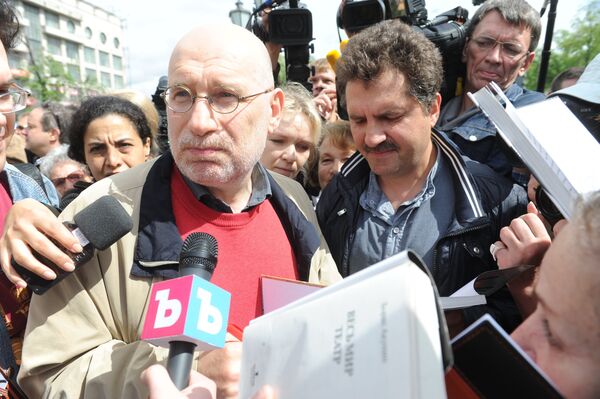A host of Russian literary figures led thousands of people through the squares and boulevards of downtown Moscow on Sunday afternoon to an opposition camp that has become the epicenter of the challenge to the rule of President Vladimir Putin.
“The authorities have to understand that they need to be respectful when they talk to the people,” bestselling author Boris Akunin told supporters. “If they chase after them with truncheons, nothing good will come of this. The more aggressive they are, the quicker everything will end for them.”
Organizers and independent media said over 10,000 people had attended Sunday’s event, one of the largest unsanctioned opposition gatherings in recent years in Russia. Police said 2,000 people were present.
Detective novel writer Akunin, popular poet Dmitry Bykov, and around ten other writers announced Sunday’s “Test Stroll” after some 600 people were detained as they gathered at downtown Moscow landmarks in the wake of Putin’s May 7 inauguration. Protest leaders alleged arbitrary and illegal arrests of anti-Putin activists.
Opposition figureheads Alexei Navalny and Sergei Udaltsov were jailed for 15 days on May 10 on charges of disobeying police orders as they met with supporters in the capital. Their arrests followed sustained clashes between police and protesters at a Moscow rally on the eve of Putin’s return to the Kremlin for a third term.
“The aim of our experiment is to determine – can Muscovites walk freely around their own city or do they need a special pass?” Akunin wrote in his blog on Wednesday.
And the authorities seemed keen on Sunday to avoid a repeat of last week’s violence, with a barely visible police presence making no attempt to crack down on crowds of opposition supporters, many clutching Akunin novels and wearing the white ribbons that have become the symbol of Russia’s protest movement.
“I’m here to carry out this test stroll,” said marketing manager Alexander Ivanov. “It’s been pretty uncomfortable walking around the city recently. It was a clever move by the police to stay away.”
A 2km stretch of central Moscow was packed solid at the height of the walk, which began at a square named after Alexander Pushkin, Russia’s 19th century national poet.
“It’s important that today’s walk was organized by people who are not politicians,” said well-known journalist Sergei Parkhomenko, one of the organizers of Sunday’s event. “We have established a very important right here – the right to walk around our own city.”
Akunin and his supporters ended their “stroll” at a five-day-old opposition camp in downtown Moscow’s trendy Chistye Prudy neighborhood. Putin’s spokesman, Dmitry Peskov, said on Thursday that police would break up the “illegal” camp, but security forces have so far made no move to disperse protesters.
Opposition parliamentarian Dmitry Gudkov, who has been a frequent visit to the camp, told RIA Novosti on Sunday that activists would remain at Chistye Prudy until a planned June 12 anti-Putin protest march in Moscow.



